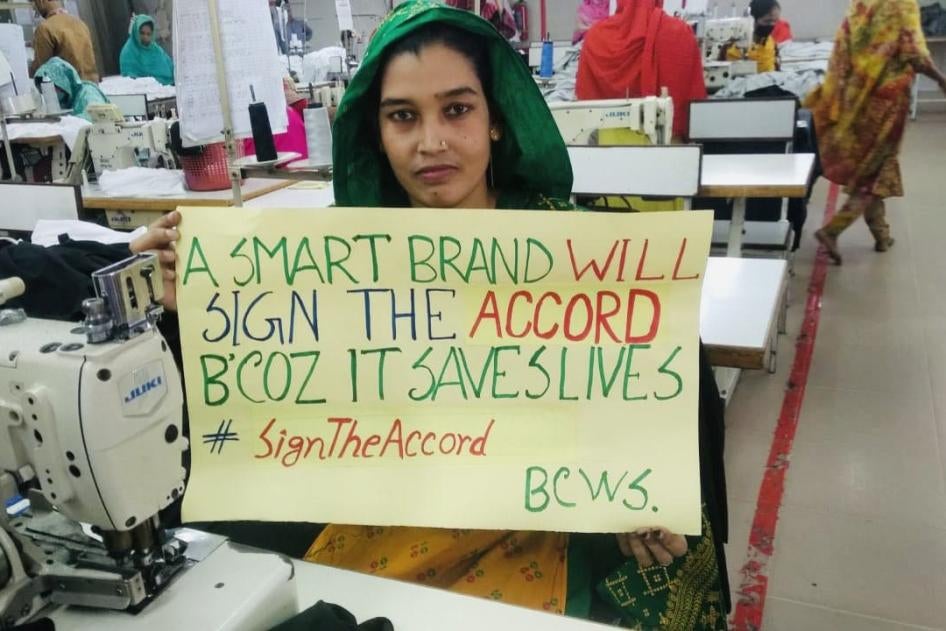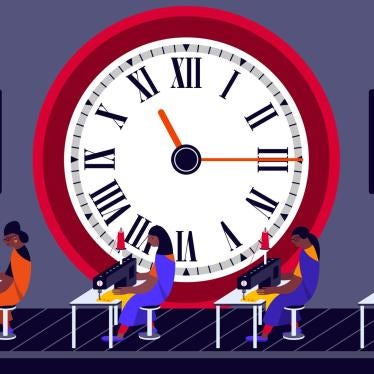(New York) – Many clothing brands, mostly from the US, have not joined the Accord on Health and Safety in Bangladesh and Pakistan a decade after the collapse of the Rana Plaza building in Bangladesh that killed over 1,100 garment workers and injured more than 2,000, Human Rights Watch said today. Joining the Accord is a way for brands to signal that they back the strongest possible safeguards available to date against fire and building safety risks for factory workers.
The International Accord on Health and Safety in the Textile and Garment Industry, which covers Bangladesh, was first signed in May 2013. It is a legally binding agreement between clothing brands and global unions that created an inspection and remediation program to mitigate fire, building, electrical, and boiler safety risks for factory workers. The program also includes a complaints mechanism for workers to file grievances about health and safety concerns and violations of their right to organize. In December 2022, the Accord announced its expansion to cover garment and textile factories in Pakistan.
“The Accord on Health and Safety is the strongest indicator for consumers that a brand is committed to protecting workers from fire and building disasters in Bangladesh and Pakistan,” said Aruna Kashyap, associate corporate accountability director at Human Rights Watch. “Nearly 200 global brands are part of the Accord and others need to follow.”
As of April 11, 195 brands are part of the Accord in Bangladesh, and 45 brands are part of the Accord in Pakistan. Many other brands, mostly from the US, have yet to join.
The Accord is unique because it is a legally enforceable agreement that brands have signed with workers’ unions to implement worker safety measures, Human Rights Watch said. The clothing companies are required to follow protocols developed under the Accord.
Under the Accord, clothing companies cannot prematurely cut business ties with factories after inspections detect fire, electrical, or building safety gaps. Instead, the brands are obligated to support remedial action and give factories sufficient opportunities to correct safety hazards. Only after the Accord’s secretariat determines that corrective actions have been repeatedly delayed with no progress on the part of a factory are brands obliged to responsibly end business ties with the factory.
Under the Accord, all inspection reports and remediation efforts are published for everyone to see. Workers can pursue arbitration if brands breach their contractual agreement with workers’ unions.
A variety of other private initiatives exist alongside the Accord, including social audits and certifications. Clothing brands may use these without accurately explaining how these other private initiatives differ from the protections of the Accord. This can confuse or inadvertently mislead consumers, investors, and regulators to believe the safeguards under these other private initiatives are equivalent or similar to the Accord.
Some commonly used private initiatives include standard third-party audit programs like Sedex’s SMETA audit and amfori’s BSCI audit; factory-level certification programs like Social Accountability International’s SA8000 certification and Worldwide Responsible Accredited Production (WRAP) certification; as well as other health and safety programs like Nirapon and IDH’s Life and Building Safety Initiative (LABS).
Where firms administer social audits, certifications, or provide other services to mitigate health and safety risks for workers, they should disclose the limitations of their services and offer an accurate comparison with the Accord’s features if they do not already do so. Making these kinds of disclosures and accurate comparisons publicly available would help avoid inadvertently misleading consumers, investors, or regulators, Human Rights Watch said.
amfori, a Brussels-based organization, operates the Business Social Compliance Initiative (BSCI), a social audit program. In 2013, when the Rana Plaza building collapsed in Bangladesh, two factories inside the building were found to have been audited using the amfori BSCI standard. The firms that had conducted these audits in one of the factories acknowledged that they do not assess building safety and that BSCI auditors do not have the necessary technical expertise to do so. amfori acknowledged that the “Accord and its implementation plan are a comprehensive set of measures which are complementary to the activities within the BSCI framework focusing on working conditions in the factories. [emphasis added]” Today, amfori describes itself as an organization that helps its “members monitor with world-class tools [emphasis added]” and that “[b]y taking part in amfori BSCI members can have a clear and consistent approach that highlights best practices [emphasis added].”
Sedex, a UK-based organization, says it has 74,000 members, has conducted 300,000 audits (including SMETA) across 170 countries, and that 28 million workers are “impacted by Sedex members.” It’s among the largest third-party social audit schemes worldwide. Sedex says its staff “engage with companies and our community to continuously improve their environmental, social, and governance (ESG) outcomes [emphasis added]” and that members can “identify, manage and assess social and environmental supply chain risks with Sedex’s trusted suite of tools, data, and services. [emphasis added]” In its June 2021 Apparel Manufacturing Sedex Insights Report, Sedex recommended that businesses “support and sign up to a new Accord on fire and building safety.”
In March, Human Rights Watch wrote to amfori and Sedex, with questions about how many of their respective member brands and retailers source from Bangladesh and Pakistan; the number of factories they source from in these countries; the number of members that have yet to commit to the Accord; and the measures Sedex and amfori take to track their members’ use of the Accord.
Human Rights Watch also asked amfori and Sedex whether their members can face any consequences for not joining the Accord and whether the organizations will periodically publish an update of which of their members are signing the Accord to go beyond social audits and those that are not.
Sedex responded to Human Rights Watch on April 13 that it does not track whether its member buyers (brands or retailers) participate in the Accord. It estimated that at least 19 of its member buyers are signatories of the Bangladesh Accord, covering over 600 factories, and that in Pakistan at least 5 Sedex member buyers are Accord signatories, covering over 150 factories. In Bangladesh, over 1,400 factories from the garments, footwear, and textile sector have had SMETA audits and over 690 factories in Pakistan similarly underwent SMETA audits between April 1, 2021, and April 12, 2023. Sedex has not provided disaggregated data for garments, textile, and footwear factories. It has also not provided data on the number of its member buyers who have not joined the Accord in Bangladesh and Pakistan.
Sedex said that it “does not set requirements for, or sanction, [its] buyer members for the content of their due diligence programmes, including participation in industry initiatives.” It also said that it “do[es] not assess or publish information on [its] buyer members’ programmes, including participation of the Accords.”
amfori sought more time to respond.
All businesses have human rights responsibilities in accordance with the United Nations Guiding Principles on Business and Human Rights and related guidance, including the Gender Dimensions of the Guiding Principles on Business and Human Rights. This includes private organizations developing and marketing products and services to support brands and retailers to prevent and mitigate human rights risks in their global value chains. These private organizations should conduct human rights due diligence regarding their respective products and services.
As private providers of services that have a clear public interest – protecting workers’ rights – their responsibilities to conduct human rights due diligence should extend to examining which brands they are offering their services to and in which regions, whether to continue doing so, and the conditions under which they offer these services. For example, those providing health and safety risk mitigation services in Bangladesh and Pakistan should assess the dangers for workers from brands’ exclusive use of their services and take appropriate measures to curb such exclusive use. Depending on the scope and limitations of their respective services, such measures could include introducing terms that restrict exclusive use of their services without other complementary measures like participation in the Accord. These private providers should be clear about the methodologies they use, the limitations of their products and services, and ensure that the use of their products and services is not knowingly or unknowingly misrepresented to consumers, investors, and regulators, Human Rights Watch said.
“Firms that don’t already take steps to publicize the limitations of their health and safety risk mitigation services should be up-front about them and provide an accurate comparison to the Accord’s features,” Kashyap said. “They should be clear that they don’t provide access to legally enforceable remedies for workers like the Accord does.”
Countries should adopt legislation governing how companies respect human rights in their global value chains. Such legislation should empower regulators to scrutinise, and sanction as appropriate, a brand or retailer’s conduct as well as the conduct of all other private actors that support brands to conduct human rights due diligence. It should also require brands to demonstrate how they conduct due diligence on their business practices to ensure that unfair prices and other purchasing practices do not drive labor abuses in global value chains.









